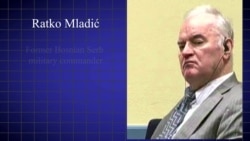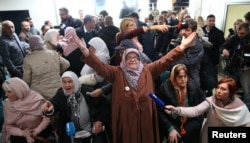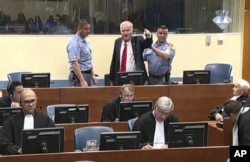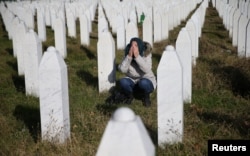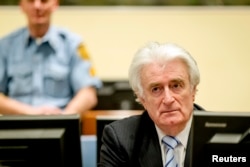The United Nations' Yugoslav war crimes tribunal ruled Wednesday former Bosnian Serb army leader Ratko Mladic is guilty of genocide, war crimes and crimes against humanity stemming from the conflict in the former Yugoslavia during the 1990s.
The court convicted Mladic on 10 of the 11 charges he faced, including persecution, extermination, murder, deportation, terror and unlawful attacks on civilians. He was sentenced to life in prison.
"The crimes committed rank among the most heinous to humankind, and include genocide and extermination as a crime against humanity," judge Alphons Orie said in reading the verdict.
Genocide
The court said Mladic intended to destroy the Bosnian Muslim population in Srebrenica, and in Sarajevo personally directed a campaign of shelling and sniping meant to spread terror and perpetrate murder among civilians.
It also cited as a window into his motivations his expressions of a commitment to seek an ethnically homogenous Bosnian Serb republic.
Mladic appeared in the courtroom, but was not present as Orie read the verdict. He requested a bathroom break partway through Wednesday's session, which was granted for five minutes but stretched on for 45 minutes.
When the proceedings resumed, his lawyer said Mladic's blood pressure was dangerously high and requested the judge either stop reading the verdict or skip ahead to the court's judgment.
Orie said the proceedings would go on as planned, at which point Mladic started yelling until he was ordered removed from the courtroom.
'Butcher of Bosnia'
After the verdict, U.N. human rights chief Zeid Ra'ad Al Hussein praised the court's decision as a "momentous victory for justice" and the "epitome of what international justice is all about."
"Today's verdict is a warning to the perpetrators of such crimes that they will not escape justice, no matter how powerful they may be nor how long it may take," Zeid said in a statement.
A State Department official said Wednesday the United States supports the International Criminal Tribunal for the former Yugoslavia (ICTY) and respects its ruling.
"We will continue to commemorate the victims of the horrific crimes committed in the former Yugoslavia," the official said. "We urge the countries and peoples of the region to refrain from divisive rhetoric and work together to build a better future for the entire region."
WATCH: ICTY Hands Down Mladic Verdict
Mladic, known as the "Butcher of Bosnia," is the last former military leader to face war crimes charges in the court, which was set up to deal with the aftermath of the Bosnian war that raged from 1992 through 1995.
He was charged with 11 counts of genocide, war crimes and crimes against humanity for his alleged role in leading sniper campaigns in Sarajevo and the 1995 killings of more than 8,000 Muslim men and boys in Srebrenica — the worst massacre in Europe since World War II.
Prosecutors asked the International Criminal Tribunal to sentence Mladic to life in prison. Last year, attorney Alan Tieger said anything less than a life sentence would be "an insult to the victims, living and dead, and an affront to justice."
Mladic’s defense lawyer, Dragan Ivetic, accused prosecutors of seeking to make the former general a "symbolic sacrificial lamb for the perceived guilt" of all Serbs during the war. He called for Mladic, 75, to be acquitted on all charges.
At the end of the war in 1995, Mladic went into hiding and lived in obscurity in Serbia, protected by family and elements of the security forces.
Mladic was indicted for genocide and crimes against humanity but evaded justice for 16 years. He was eventually tracked down and arrested at a cousin's house in rural northern Serbia in 2011.
The Bosnian Serbs' political leader, Radovan Karadzic, was found guilty of war crimes in March 2016 and sentenced to 40 years in prison.




